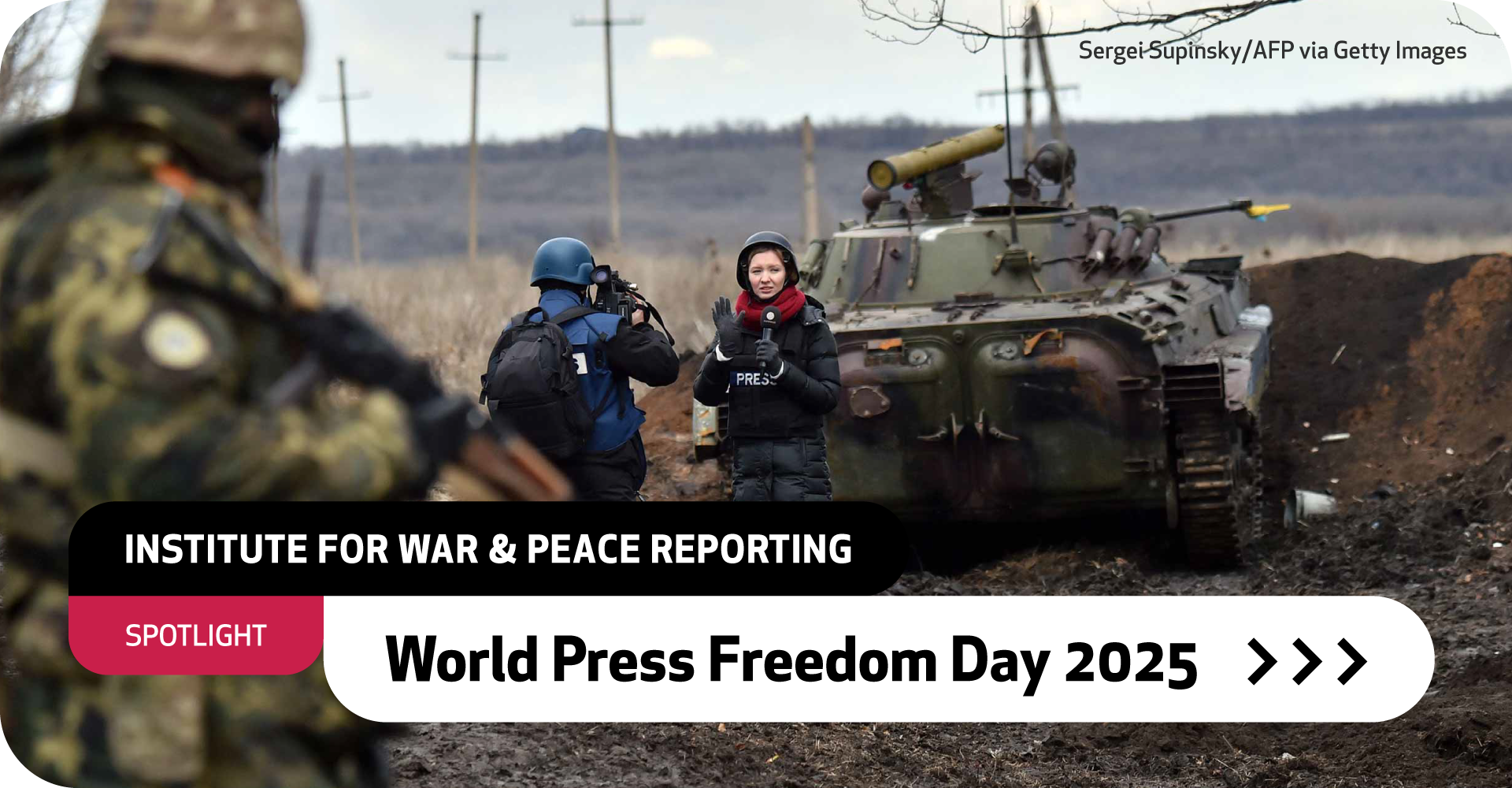Ukraine: The Challenges to Covering War Crimes Trials
Reporters often face obstacles accessing court and can struggle to source both training and support.
Ukrainian journalists are on the frontlines of documenting war crimes justice processes amid the ongoing conflict in their country.
Court proceedings can be slow and complex, demanding both patience and a solid grasp of international law. Trials are often held in closed session, and the judicial system does not always support a reliable flow of information.
“Access is often hindered by a range of systemic and logistical barriers”.
Oksana Romaniuk leads the Institute of Mass Information (IMI), a Ukrainian NGO protecting freedom of speech and supporting the development of Ukrainian journalism. She told IWPR contributor Monical Ellena that “more effective” systems and dedicated training were needed to support this specialised area of reporting, itself a key factor in delivering justice and accountability.
IWPR: Access to court hearings and legal documents is key for journalists to be able to report accurately on war crimes justice processes. What difficulties do reporters face in accessing trials or legal proceedings?
Oksana Romaniuk: Ukrainian journalists encounter significant obstacles when trying to cover war crimes trials, with access often hindered by a range of systemic and logistical barriers.
Chief among these are closed court hearings, frequently justified by security concerns, which limit transparency and restrict the media’s ability to report on proceedings. Moreover, collaboration between the judiciary and the press remains inconsistent, impeding the flow of timely and accurate information.
These challenges are even more pronounced for regional reporters, who frequently operate with limited financial and institutional resources. Access to legal documents is often fragmented and unreliable, further complicating efforts to deliver comprehensive and fact-based coverage.
IMI has called for the development of a standardised court communication policy and the implementation of more effective systems to guarantee timely, transparent, and equitable media access to judicial processes.

How familiar are Ukrainian journalists with the procedures and nuances of war crimes investigations and justice mechanisms?
Journalists have been documenting evidence of war crimes since the beginning of Russia’s full-scale invasion. They often work in extremely dangerous conditions, gathering evidence in areas where fighting continues or are under occupation is particularly complex and perilous. [But] many journalists lack familiarity with the legal criteria that define war crimes, the evidentiary standards required by institutions such as the International Criminal Court, and the correct methods for collecting and preserving documentation in a manner that ensures its admissibility in formal legal proceedings.
At IMI, we observe that while Ukrainian journalists are exceptionally motivated and courageous, they often lack the necessary training to effectively collaborate with investigators and human rights organisations, or to engage appropriately with victims.
Additionally, they face significant ethical challenges—such as how to report sensitively on survivors of war crimes while safeguarding the integrity of evidence and avoiding any interference with ongoing or future legal proceedings.
From a media perspective, how can these knowledge or resource gaps be addressed?
Training and funding are key. Many reporters do not fully understand legal definitions and standards required to prove the crimes in court. They often lack clarity on how international and domestic justice systems function—what the steps are, who the key actors are, and how long justice processes may be. In addition, war crimes coverage often involves work with deeply traumatised victims and survivors: journalists are not trained in ethical interviewing, consent, or minimising re-traumatisation.
Among other challenges is the work with evidence. Some journalists collect footage or testimonies that could serve as evidence, but, unfortunately, they do not know how to handle it to make it admissible in court.
The main gap, however, is a dire shortage of funding, particularly in regional media outlets, and human resources for long-term investigations into war crimes. Some outlets collaborate with international media and legal experts, while using digital tools like satellite imagery and open-source intelligence to verify evidence and receive specialised training in legal and investigative journalism to improve coverage.
The scale is so huge though, more should be done to support this work, particularly in the regions.
How do media outlets and public organisations currently collaborate with the judicial system and international institutions, and what could improve these partnerships?
Collaboration between media outlets, public organisations, and the judicial system or international institutions has been growing. For instance, IMI actively collaborates with the Prosecutor General’s office on investigation of war crimes against media and journalists.
We also have a strong partnership with parliamentary committees on freedom of expression and on information; we work together on developing policies and legislation to improve the conditions for journalistic investigations. We regularly share documentation and expertise.
However, media outlets and journalists often rely on personal connections or informal channels to access information or coordinate on war crimes coverage. Systematic frameworks for collaboration, joint briefings, or information-sharing protocols are still lacking.
Ukraine would need more structured and transparent communication platforms that connect journalists, investigators, and civil society actors. International partners can also play a role by supporting such mechanisms and by funding joint projects that bridge legal and journalistic work.
Investigating war crimes is emotionally taxing, are there psychological support mechanisms for reporters?
Psychological support for Ukrainian journalists covering war crimes remains limited, especially for regional and freelance reporters. While some international organisations and major media outlets offer access to trauma counselling, many journalists continue to work without any structured mental health support.
As a result, they face chronic stress, burnout, and exposure to secondary trauma, with long-term impacts on their well-being and professional sustainability. To address this, media organisations and donors must treat mental health care as an essential part of journalist safety. This includes providing regular psychological check-ins, access to trauma-informed therapy, and resilience training as standard support for those reporting on conflict and atrocities.

